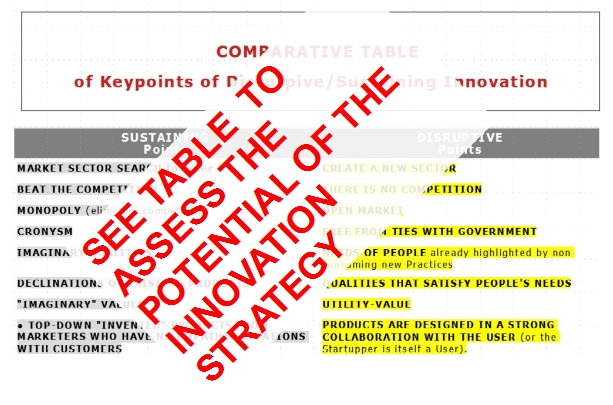
Most of the considerations on the near future of Business are wrong because they are based on a “linear” conception of the evolution of the Market that is not able to perceive what the real changes are taking place.
Radical changes are not an option: those who do not adapt to the new Demand° are out of the Market.
There are a lot of misandestundings about Disruptive innovation°.
In times of radical change (Breaking Point°) like the current one, to develop an effective Innovation – changes in strategies – it is necessary to follow the principles of Disruptive Innovation, or changes are produced that do not bring anything positive to the Value of the product (to the results of sales).
That is, when you are in a phase of non-linear evolution (Disruption Age°) it is necessary to make a radical change° of mindset and structures (a true change of the Business Paradigm).
The Disruptive Innovation
In the eras of disruption it is necessary to develop new skills of interpreting the New Demand° (a Trends Forecasting more suited to the new Disruption Age°). Trends Forecasting for the Disruption Age
Today it is necessary to develop a New Marketing° that overturns its paradigm, the Marketing of pro-sumers (the Participated Marketing).Toward to New Marketing (1): Beyond the tools of the current market
To understand the New Demand, it is necessary to understand that either we adapt to trends
with a correct interpretation or sooner or later we are thrown out of the market (or politics). Trends Forecasting for the Disruption Age
Isn’t it a contradiction to want to develop Customer-driven and tech-driven strategies at the same time? Either the focus is on technology, or it’s on Customers.
The fact is that those who manage the strategies or are led to develop the human aspect of product development, or are led to develop the technical aspect.
And today the technical skills, for those who develop a product, have an insignificant importance, since by now the consumer-techs are understandable and manageable by anyone.
While in the Business the Human Factor is lacking today: is lacking the “human” capacity to interact with the Customers, to understand their needs, which are today much more complex because they are hidden and in continuous development.


